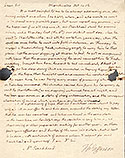The Tragic Marriage of Ann Cary Bankhead
Former Monticello Guide Katy Gehred tells the story of Ann Cary Randolph, whose married an alcoholic (who later got into a fight with Thomas Jefferson Randolph in downtown Charlottesville).
 In the letter reproduced below, Jefferson anxiously describes a sad and ultimately insoluble family situation.
In the letter reproduced below, Jefferson anxiously describes a sad and ultimately insoluble family situation.
Charles Lewis Bankhead (ca. 1790–1833) was the son of Thomas Jefferson's good friend John Bankhead and his wife, Mary Warner Lewis Bankhead. In 1808 the younger Bankhead married Jefferson's eldest grandchild, Ann Cary Randolph (b. 1791), the daughter of Martha Jefferson Randolph and Thomas Mann Randolph (the "mr Randolph" mentioned below). Four of the couple's children survived infancy.
Although trained as an attorney, Charles Bankhead never practiced law, turning his attention instead to farming at an early age. In 1811 he purchased Carlton, an 800-acre tract next to Monticello. No better suited to agriculture than the law, Bankhead proved to be an abusive, improvident, and alcoholic husband. Deteriorating relations with his in-laws culminated in an 1819 quarrel outside the Albemarle County courthouse in which Bankhead critically wounded his wife's brother Thomas Jefferson Randolph. Bankhead fled the county, but he reunited with his wife shortly thereafter and saw her die from complications following childbirth in 1826.
It is most painful to me to be always addressing on a distressing subject one whom I so highly esteem, and who merits so much to be spared every possible pain. but your request, my promise, and the happiness of us all require it. mr Bankhead stood his ground firmly until Monday last (the 8th) our district court day, when he went to Charlottesville, and all his resolution gave way. when the spell was once broke he went into full indulgence. on Thursday he engaged a Fredericksburg hack, returning empty, to carry him to that place: but the driver stopping at Milton to feed, he got so overpowered with liquor that the driver percieving he could never get him to Fredericksburg, brought him here. he went to bed immediately & kept it chiefly for two days during which we succeeded in keeping liquor from him in the hope that he might cool and recover his resolution. but in the mean time he was trying every means of procuring whisk[ey] & on Saturday succeeded. this stimulus raised him from his languer; he went to Charlottesville (as we suppose) returned here at night, and has been ever since in a state of strong intoxication, and the consequent aberration of mind which you have probably witnessed.
Oct. 16. a glimmering of hope that mr Bankhead would consent to pay you a visit, on our offer to send him down, suspended the closing my letter. that however has vanished, and he has continued in the same state.
in the mean time mr Randolph says the plantation is going to ruin, no wheat sowing or other preparation making for another year. on these facts your affections and knolege of the case will dictate what is best to be done. with sentiments of sincere esteem & respect for mrs Bankhead and yourself I am Dr Sir
PoC (ViU: TJP-ER); on verso of reused address cover of Dabney C. Terrell to TJ, 12 June 1816; mutilated at seal, with most missing words rewritten by TJ; at foot of text: “Dr Bankhead”; endorsed without date by TJ. Recorded in SJL as a letter of 16 Oct. 1816.
Charles L. Bankhead’s Carlton estate was going to ruin. His letter of 4 Aug. 1816 to TJ, not found, is inconsistently recorded in SJL as received from Carlton the previous day.
COPYRIGHT NOTICE: Published by Princeton University Press and copyrighted, ©, by Princeton University Press. All rights reserved. No part of this book may be reproduced in any form by any electronic or mechanical means (including photocopying, recording, or information storage and retrieval) without permission in writing from the publisher, except for reading and browsing via the World Wide Web. Users are not permitted to mount this file on any network server.

Former Monticello Guide Katy Gehred tells the story of Ann Cary Randolph, whose married an alcoholic (who later got into a fight with Thomas Jefferson Randolph in downtown Charlottesville).
ADDRESS:
931 Thomas Jefferson Parkway
Charlottesville, VA 22902
GENERAL INFORMATION:
(434) 984-9800